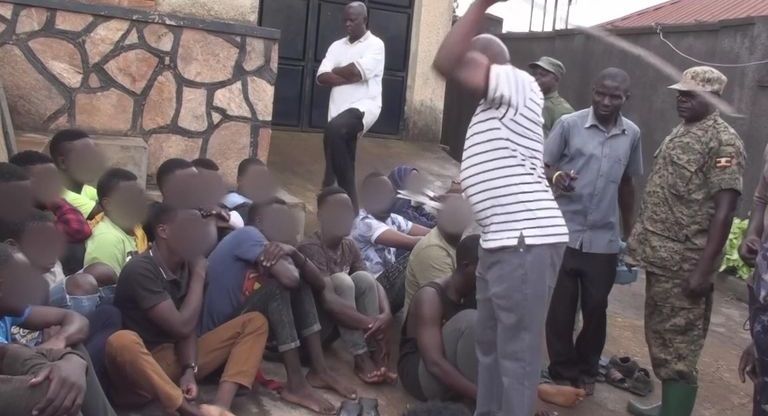Queer Ugandans beaten with iron rods, burned with firewood and forced to confess to being gay after ‘bogus’ shelter raid

In a 2020 raid, Ugandan men were whipped by officials before being chained and walked to the police station. (Screen capture via YouTube)
LGBT+ Ugandans arrested under dubious coronavirus charges have revealed the harrowing levels of abuse they faced while in prison – being beaten with iron rods, burnt with firewood and forced to “confess” their identities.
In interviews with The Guardian newspaper, two of the approximately 20 people arrested earlier this year at an LGBT+ shelter described how seemingly government-sponsored homophobia has been veiled by measures purported to curb the coronavirus.
Indeed in Uganda, the fight for LGBT+ rights means fighting for survival, they said. In March, police pounced on the shelter, where a municipal mayor caned the group before security agents chained and marched them to a police station.
“They tied us like slaves and marched us through a trading centre full of homophobic people,” explained Ronald Sssenyonga, a 21-year-old student.
“Some people slapped us. Others hit us with stones or whatever they could find. They shouted and condemned us.”
Harrowing footage emerged of the raid, which activists said was part of a slew of targeted attacks by law enforcement against the community.
After the sudden police raid, at a shelter run by non-profit Children of the Sun in Kampala, the queer men and trans women spent almost 50 days on remand, without access to legal counsel for the first 42.
Subsequently, a top local human rights organisation launched a lawsuit against Ugandan authorities, claiming the group suffered “cruel and inhuman” torture in prison.
“They thought we were nobody, and we had no one on our side,” Sssenyonga said of his time in jail. “They burned us with firewood and forced us to confess that we are gay.
“They used abnormal size sticks and iron bars [to beat us], and they turned other prisoners against us.”
LGBT+ Ugandans have ‘nowhere to go’ after being arrested and goaded by authorities to come out.
Prosecutors did not charge the group under the country’s barbed anti-LGBT+ laws. Instead, they were charged with disobeying coronavirus regulations on social distancing – part of a new playbook of autocratic authorities exploiting the pandemic to hastily push authoritarian laws and persecute marginalised and vulnerable groups.
Before the raid threw his life into jeopardy, Ssenyonga was a typical student – worried about his A-level results and excited to start university.
“But after they showed my face in the video, everyone knows I am gay,” he said.
“I am too ashamed to show my face at school. So I do not know what the future holds when I cannot even go out to pick up my results.”
And for his neighbour, Tevin Haris Kifuba, morale is similarly wilting. Working at a small media shop, Kifuba edited videoes before he was arrested during the raid. The viral video ruined any chance of him returning to his job or living with his family.
“I had to accept that I was gay because it is who I am,” he told The Guardian.
“It broke my mother’s heart. The village was spitting fire. Before, I could at least return home.
“But I had to leave the village, and now I have nowhere to go.”

